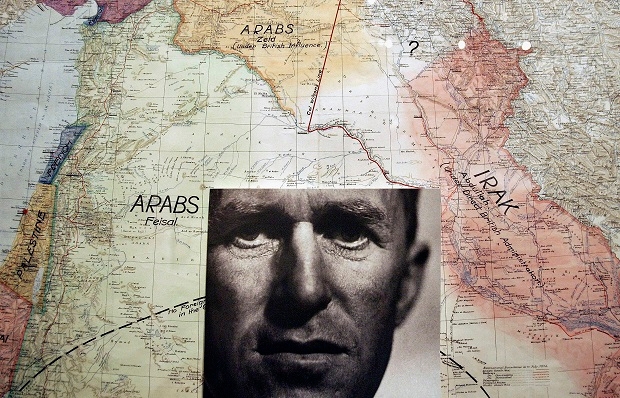In Britain we seem to be obsessed by what our politicians are reading this summer. It tells us, so we think, about the way they’re thinking or perhaps just what they want us to think they’re thinking. Why don’t we study what other political leaders are interested in? Lebanon’s Daily Star offered us a revealing vision of one regional actor, Hezbollah’s Secretary General Sayyed Hassan Nasrallah.
Sitting with Lebanon’s veteran Druze leader, Walid Jumblatt, in late July, Nasrallah has a copy of James Barr’s A Line in the Sand in front of him. The book, one of the best researched and most readable studies of the making of the modern near east (read The Spectator’s review here), offers a tantalising glimpse of what might have been. Barr sets out Lawrence of Arabia’s vision of what the region could have looked like if the tribal lines matched national boundaries.
It isn’t clear from the photograph whether the book is light reading to pass the time between meetings, or a gift from Jumblatt, but it is interesting that the Iranian-backed cleric is thinking about today’s borders.
He isn’t alone. In Iraq, his paymasters are manipulating President Maliki in such a way that a split is becoming inevitable. Already the Kurdish autonomy is independence in all but name, and the so-called Islamic State is more powerful than the Iraqi Army.
These Salafist murderers started off by killing more Muslims than anyone else after declaring those who don’t share their view of Islam as apostates. But now they have started to redraw the borders completely. Their ethnic cleansing, rape and taking women into slavery is creating new realities in the region.
They see no division between their lands in Syria and Iraq, nor do they exclude Jordan, Saudi Arabia or Kuwait from their vision of conquest. Indeed those who have been paying them, supporting their jihad against Shia-backed regimes under President Assad in Syria and Maliki in Iraq, are beginning to realise that they may be caught up in the whirlwind of change themselves.
After all, as Barr reminds Nasrallah, the boundaries they are shaking are new. Barely 90 years ago they were meaningless, as nomads crossed them without knowing they were there and control rested solely on the allegiances people gave. Some, sensibly, gave multiple allegiances to allow them free movement. Few accepted concepts like nationality that could divide them.
So as today’s allegiances break down and fracture, it will be interesting to know what that means for the old rivalries. Will the Rashidis of Hail, once backed by the Turks (until the Ottomans lost the first world war), seek their revenge on the then British-backed Sauds? Will the Shia populations of the Gulf States and eastern seaboard of Saudi Arabia get the chance to add some new borders of their own?
There are no clear answers to these questions, so perhaps it is good that people are beginning to think about the alternatives. I would be interested to know who, as well as Nasrallah is thinking about the changes in the region, and perhaps one indicator would be how many are studying their history. Now that’s one useful thing Amazon could tell us.
Tom Tugendhat is Director of Lashkar & Co






Comments